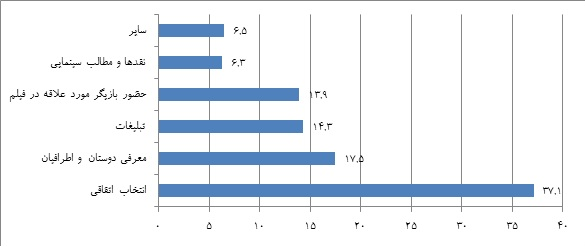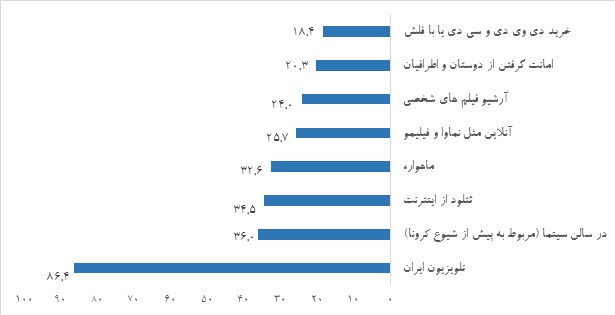How do Iranians watch movies and TV series?

Fars News Agency – Art Group: The results of the National Survey of Iranian Cinematic Taste show that the Iranian people are twice as interested in watching the series as the movie. They watch movies and series, and 18.3% of Iranians do not watch any movies or watch at most one movie a year. Interestingly, among the most common ways of watching movies and series, Iranian television ranks first with 86.4% and with a significant difference. According to the survey, 47.5% of the Iranian film-watching population, who watch at least two movies or series during the year, prefer to watch the series to the movie, and 24.4% of the movie-goers prefer to watch the movie. For 28.1% of viewers, there is no difference between a movie and a series. The use of cinemas to watch movies (before the corona outbreak) is also ranked second with 36% and movie download from the Internet is ranked third with 34.5%. While archiving personal films, choosing 24% of viewers and borrowing from friends and relatives with 20.3% and buying DVDs, CDs or using flash with 18.3% are other less popular ways to watch movies and series. According to the results of this report, there is no difference between the residents of different provinces of the country in terms of preferring the series over the film. Analysis of the data of this study shows the high statistics of watching movies and series via satellite in the border provinces of East and West Azerbaijan and Khuzestan. Men, meanwhile, watch more movies than women, academics more than non-academics, employees more than the unemployed, and urbanites more than villagers. Details of these statistics have not been released, however.
This survey shows that although watching movies and TV series in different ways forms a part of people’s daily lives, except for a very small group of cinema professionals, the choice of others in the field of movies and TV series is somewhat “random” and of course related to entertainment. .
According to Fars, one of the axes of the research of the National Survey of Iranian Cinematic Taste, which was conducted by the Institute of Culture, Art and Communication on behalf of the Cinema Organization, was the preferences and cinematic tastes of the respondents. This survey shows that although watching movies and TV series in different ways forms a part of people’s daily lives, except for a very small group of cinema professionals, the choice of others in the field of movies and TV series is somewhat “random” and of course related to entertainment. .
However, the limitations of navigation in general or the conceptual and practical limitations of this navigation may be involved in the emergence of such a perception. However, it is difficult to draw different conclusions from the current findings, either in this survey or in similar surveys.
Leaving aside the case of comedy films, whose names are among the interests of most of the respondents, practically no recognizable tendencies can be found in the preferences and choices of the respondents. Most of them did not even remember the movies and TV series they had just watched. Watching movies and series for a large part of the population does not follow a certain conceptual or aesthetic logic. Naturally, this is especially true of “foreign films.” Most respondents (except for a few minorities) not only do not know much about non-Iranian filmmakers or films, but are not even familiar with Hollywood actors in the current “celebrity” space.
Watching movies and series for a large part of the population does not follow a certain conceptual or aesthetic logic.
According to the survey findings, apart from those domestic TV celebrities who were broadcasting programs at the time of the survey and were present in the memory of the audience, other artists are at best only a very small part of the population. The point that may seem to violate this finding is the millions of followers of the actors on Instagram. This number of followers does not necessarily mean being known to the general public. Based on these findings, the impact of domestic films, series, and artists on the diverse and complex generality of public opinion or social attitudes seems to be less than is generally thought. However, we still have to point out the limitations of the survey findings for conclusive assessments on this issue.
So, in a general picture, we are dealing with a society in which about 20% of the film and series have basically no place. This part of the society has less cultural consumption compared to the whole population. A significant part of the population follows movies, series and serials mainly through various radio and television networks. For this section, the most important issue is entertainment, and it usually does not encounter these works in a serious way, as most of the respondents only remember the names of the movies and series that are being aired. Comedy and “action” movies and series are more likely to attract people’s attention, but in general, it is not possible to draw a map of people’s preferences for movies and series based on genres, because based on research findings, it is not possible to distinguish different tastes by different social groups..
Comics and “action” movies and series are more likely to attract people’s attention, but in general, it is not possible to map out people’s preferences for movies and series based on genres, because based on research findings, it is not possible to distinguish different tastes by different social groups.
Another part of the population (which is not a small number in the total population of the country) has access to movies and series by downloading from the Internet or watching satellite. The taste of most of the respondents is more familiar with Iranian movies and series. Among foreign films and series, both in the film and in the series, audiences have shown interest in American and then Turkish productions. So it is not surprising that the Jam network, which broadcasts mainly Turkish-made serials, has more audiences than other satellite channels. Home show network products have not escaped the attention of the audience; However, among the ten popular series of the respondents, only one of the works of the home theater network can be seen, which of course is not unrelated to the quality and attractiveness of the series of this network that were broadcast at the time of the survey. So, in general, there is a kind of diversity and, to be more precise, dispersion in the choices and tastes of people in the field of film and series, which is consistent with the research finding that a large number of respondents choose film and series “randomly”.
By watching movies and series

Movie selection criteria

If we refer to the findings of the questions that measure the social / political implications of people’s cinematic tastes, a large proportion of respondents are neither influenced by their political choices of artists nor, in particular, of the commercials of the artists.
A large proportion of respondents are neither influenced by artists in their political choices, nor are they particularly concerned with artists’ commercials.
We face a range of votes on issues such as the billion-dollar salaries of actors, the censorship of some scenes in movies and series, and the degree to which artists are free to act. There is no definite result of public opinion on these issues.
It is also worth noting that when some respondents do not have a clear opinion about the series or popular actors, their views on these issues, which are not the concern of a large part of the population, will probably not be well thought out and shaped.
If, for any reason, these kinds of issues are addressed in the public sphere, then public opinion may be confronted with them differently.
To get a summary of the results of this research, you can click here + ![]() National survey of Iranian cinematic taste + Log in.
National survey of Iranian cinematic taste + Log in.
End of message /
You can edit this post
Suggest this for the front page

